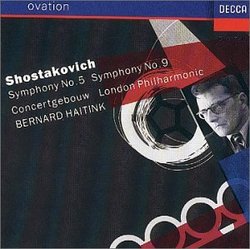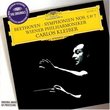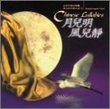| All Artists: Dmitry Shostakovich, Bernard Haitink, London Philharmonic Orchestra, Royal Concertgebouw Orchestra Title: Shostakovich: Symphonies no 5 and 9 / Haitink Members Wishing: 2 Total Copies: 0 Label: Decca Release Date: 7/18/2000 Album Type: Original recording reissued Genre: Classical Styles: Historical Periods, Modern, 20th, & 21st Century, Symphonies Number of Discs: 1 SwapaCD Credits: 1 UPC: 028942506626 |
Search - Dmitry Shostakovich, Bernard Haitink, London Philharmonic Orchestra :: Shostakovich: Symphonies no 5 and 9 / Haitink
 | Dmitry Shostakovich, Bernard Haitink, London Philharmonic Orchestra Shostakovich: Symphonies no 5 and 9 / Haitink Genre: Classical
No Description Available. Genre: Classical Music Media Format: Compact Disk Rating: Release Date: 18-JUL-2000 |
Larger Image |
CD DetailsSynopsis
Product Description No Description Available. Genre: Classical Music Media Format: Compact Disk Rating: Release Date: 18-JUL-2000 Similarly Requested CDs
|
CD ReviewsStrong Fifth, superb Ninth R. Hutchinson | a world ruled by fossil fuels and fossil minds | 02/06/2003 (4 out of 5 stars) "I give Haitink 5 stars for the Ninth, but 4 for the Fifth. The recording and performance are marvelous. This is the only version of the Ninth I've heard so far, but it's hard to imagine a better one. I enjoy imagining Stalin and his cronies fuming when they heard this sparkling little number instead of a grand, triumphant piece of bombast to celebrate the Great Leader's war victory. My standard for the Fifth is Rostropovich's 1983 recording with the National Symphony Orchestra (DG #410 509-2). It is a brutal masterpiece, with a terrifying slow 4th movement. Haitink has more skill, a far better orchestra, and better recording quality, but I don't find his interpretation nearly as powerful. He brings out all sorts of romantic flourishes from the score which Rostropovich downplays to streamline the onward momentum. For instance in a passage in the 4th movement with strings and brass ricocheting back and forth, Haitink gives the trumpets equal weight, while Rostropovich buries them, focusing only on the strings. Of the Fifths I've heard so far, Haitink's is the second-best. I am not at all impressed with Bernstein's speedy finale -- he seems to miss the point entirely. See my reviews of Mravinsky's 1984 recording of the Fifth, Gergiev's recent one, Rostropovich's new one with the LSO, and for more see my SHOSTAKOVICH: A LISTENER'S GUIDE list." Haitink vs. Lenny? More like substance vs. show.... DAVID A. FLETCHER | Richmond, Va United States | 12/04/2002 (5 out of 5 stars) "I'll weigh in amongst the fray debating the strengths of Haitink's "coolness" vs. Bernstein's pounding excitement, and those performances which fall into one camp vs. the other (I'm speaking of the 5th Symphony here; it looks like all revere the Haitink performance of the 9th). Without re-opening the Volkov/Shostakovich "Testimony" debate, I'll stake out a position quickly: this is not a happy piece, and performances which conclude with technicolor symphonic triumph miss the core of the work. That core is the Largo, containing some of the most pain-etched string writing that you'll ever hear. In non-musicological terms I'll put it like this: imagine a scene of utter and complete devastation, with an observer too defeated emotionally and psychologically to manage a sob. This kind of concentrated conducting and playing is not something that you run across often. Haitink accomplishes here what many of his detractors accuse him of being incapable of; it truly is magisterially heartwrenching. "Coolness," indeed." A strong entry in Decca's Shostakovich-Haitink line Christopher Culver | 02/09/2004 (5 out of 5 stars) "This Decca disc combines two symphonies by Dmitri Shostakovich which couldn't be more different from each other: the weighty, epic Symphony No. 5, and the sly and witty Symphony No. 9. The first is performed by the Concertgebouw Orchestra and the second by the London Philharmonic, both conducted by Bernard Haitink.The meaning of Shostakovich's 5th Symphony is controversial. It was aimed in part to please Soviet critics irked by his experiments in previous works, but there has always been speculation that under its socialist-realist surface lies a pointed jab at Communist brutes. I won't discuss the moral of the Symphony here, for in any event it depends on the authencity of TESTIMONY, Shostakovich's supposed memoirs as related to Simon Volkov. This symphony begins with a sinister opening which rapidly falls away, and from there the first three movements are mostly slow and pensive. There is some lovely string work in the second half of the third movement. The work reaches its highest point in the crashing and triumphant fourth movement, which is excellent handled by Haitink, a conductor who--in spite of his faults--has always been skillful at giving Shostakovich's loud parts the grand scale they deserve. The Symphony ends with a happy, joyful finish.The 9th Symphony was written at the end of World War II, and most people expected a huge victory symphony after the 7th ("Leningrad") and 8th Symphonies. Instead, Shostakovich delivered a joyful little ditty which in places sounds as if it came out of a comic opera. Shostakovich doesn't praise Russia's invincible might in beating Hitler, he just expresses his happiness that things can finally get back to normal. However, a shadowy, intimidating rise suggests that normal life in the Soviet Union isn't something one would want to return to.Both orchestras handle the material quite well. I expected this from the Concertgebouw, who have done some wonderful performances of other Shostakovich pieces (such as the jazz suites). The London Philharmonic surprised me, though I think that the Concertgebouw could have done better had it tackled the 9th.The sound quality of this disc is generally excellent, and it won a Gramaphone award for engineering in 1978. Every item in the orchestra is well-balanced. However, the dynamic range is quite wide, so playing it a volume high enough to hear the serene parts will probably annoy your neighbours when the loud moments arrive.All in all this is a fantastic disc, and after the 7th Symphony, it is my favourite of Decca's Shostakovich works with Haitink conducting."
|

 Track Listings (9) - Disc #1
Track Listings (9) - Disc #1








